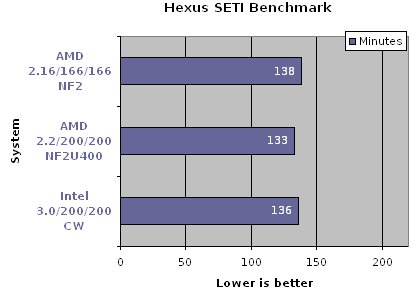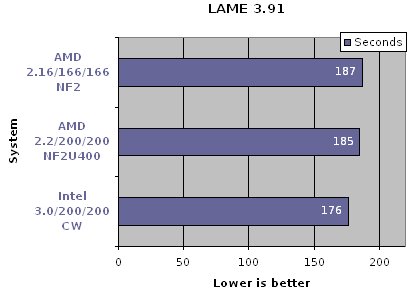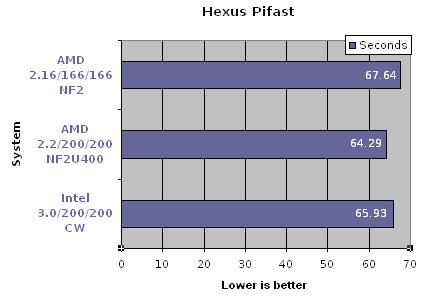|
Let's kick things off non-3D wise with SETI. AMD is traditionally strong here, especially with nForce2 helping things along. Low latency memory accesses and floating point performances are key here, XP3200+ and nForce2 Ultra 400 should do the trick.
 SETI performance
SETI performance
When Canterwood and 3.0C launched, it became the SETI platform of choice. This was more due to brute force than anything, 3000MHz and 6.4GB/sec I/O bandwidth makes a fair dent in things. But the win is short lived. This is where Athlon XP excels, in scientific calculations like we see with SETI. Floating point performance and low latency memory accesses outstrip raw MHz and the XP3200+ gets an early, deserved lead.
LAME up next.
 LAME performance
LAME performance
The MMX and general media encoding performance of the P4 is one of its undoubted strengths and this benchmark does very little to shake that. It's all about the MHz here and 3000 of them beats 2200 in this benchmark. This benchmark could be optimised in the Athlon's favour I fear, but not in the tested configuration.
An entire album to high quality MP3 in around 3 minutes is pretty good however, no matter what platform gets used.
1-1 and time for some Pifast.
 Pifast performance
Pifast performance
Similar to SETI, XP3200+ takes the lead back with some monstrous floating point performance as we calculate Pi to a staggering 10 million decimal places in under 65 seconds. A deserved win and 2-1 to AMD in the return leg at home. The Stadio De La Floating Point is a nice place to be if you are AMD.
Lastly the bastard child of our benchmarks that doesn't really fit in either 3D or non-3D sections, Sandra. All we are measuring here is the ability of the processor to read and write data using the memory controller and only the integer pipeline. I include it only to illustrate the effect the new 200MHz front side bus has over the old 166MHz.
 Sandra performance
Sandra performance
Nearly 3GB/sec buffered. The P4 does better here but due to the design of the processor it couldn't fail to be better.
So how about performance overall? 6-0 away from home at Intel's ground and only a 2-1 win at home, do AMD deserve to lose the consumer processor Champions League in May 2003?
|